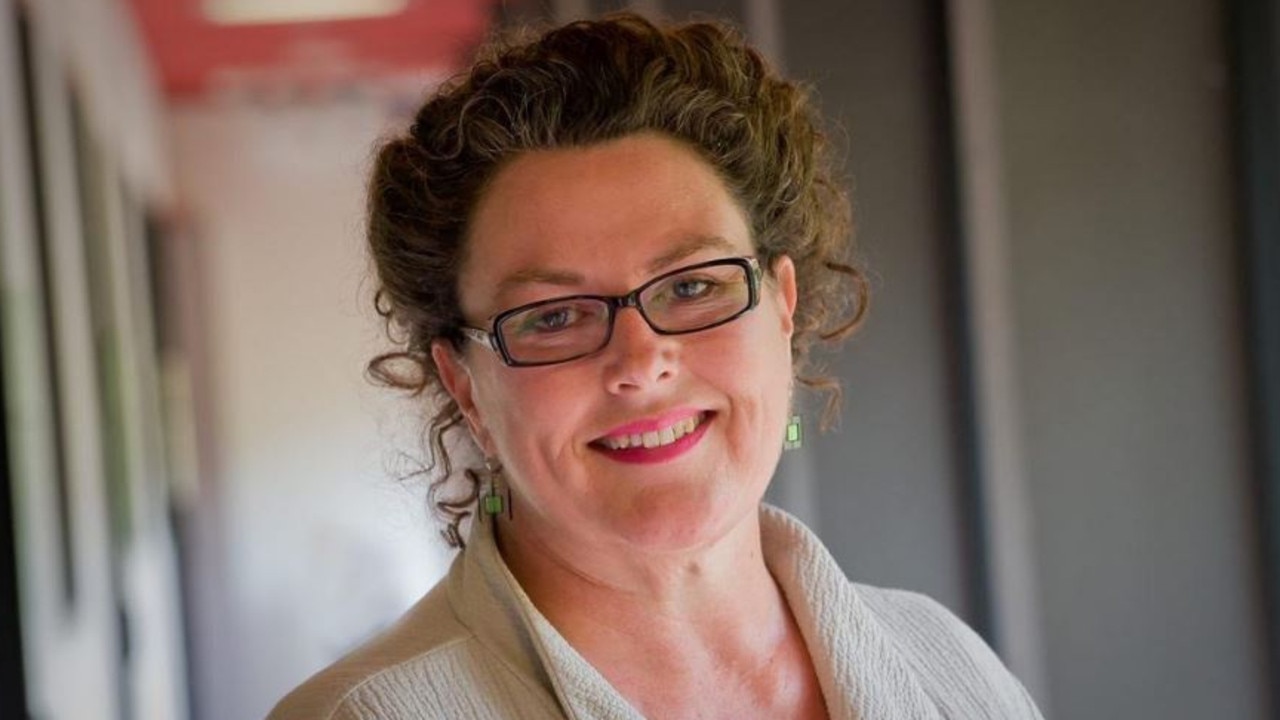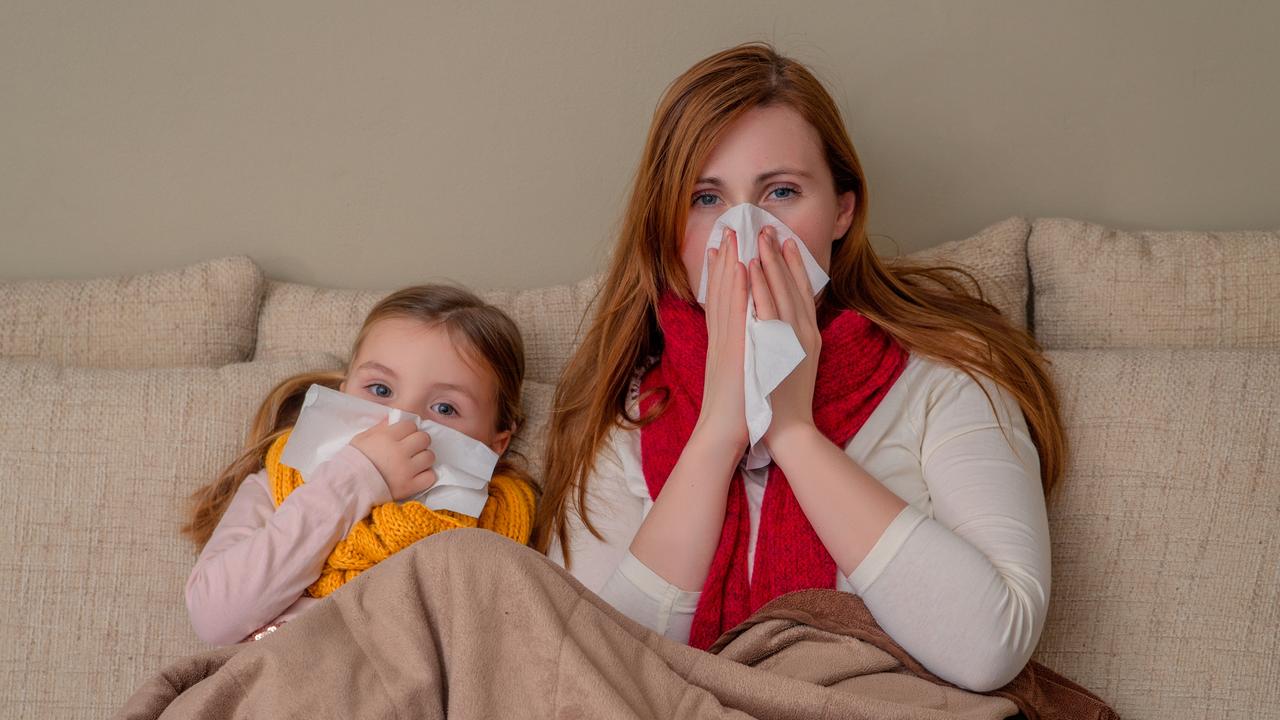Colds, flu, Covid: Health experts explain differences and what do to when sick
Aussies are being urged to mask up as a “multi-demic” sweeps the country. Here’s what you need to know about treating the viruses.
Australians are being urged to mask up when in public and work from home if sick, as a “multi-demic” of respiratory viruses sweeps the country.
A perfect storm of Covid, influenza, the common cold and respiratory syncytial virus (RSV) have hit hard, clogging emergency wards and crippling workplaces — many of them already short staffed.
Modelling suggests 5000 people could be hospitalised with Covid within the coming weeks.
Many states have reduced infection periods to four weeks, down from 12 weeks, in line with recent advice from the Australian Health Protection Principal Committee that Covid reinfection is possible after 28 days.

Infectious diseases paediatrician Professor Robert Booy, of The University of Sydney, said testing was the only way to detect with certainty which virus a person had because the symptoms overlapped.
“With the relaxation of borders six months ago, we’re all shaking hands and hugging – spreading not just Covid but all the other viruses,” he said.
“We have a ‘multi-demic’ – a handful of viruses that are spreading far and wide, partly from social contact but also the level of immunity from young children is low because of Covid [social distancing measures].
“Children who otherwise would have been exposed to these viruses at 12 months are now being exposed at age three or four – an age when they’re not very good at social etiquette and precautions.”

Deakin University Chair of Epidemiology Professor Catherine Bennett agreed that our immunity was low against other respiratory viruses because of the climate of the past two years.
“All these viruses are on the rise and we don’t have great immunity from them given the lower exposure over last two winters,” Prof Bennett said.
Here’s everything health authorities think you should know about the potentially-deadly respiratory viruses.
COMMON COLD
Rhinovirus, also known as the common cold, is the most prevalent viral infection in Australia.
The virus usually infects the nose, throat and lung, with little to no fever.
Symptoms can take up to four days to appear and can include an itchy or sore throat, blocked nose, sneezing, runny nose, watery eyes, as well as muscle aches, pain and headache.
Fever occurs in children but is rare in adults.
HOW DO I TREAT IT?
Ensure you or your child stay hydrated. Bed rest is not essential for children. Ideally, an air humidifier will help ease congestion. Antibiotics, cough medicine, cold remedies and aspirin are not necessary and should be avoided.
“If you have a child who has a cold and after one or two days, you think they’re breathing fast, those children need to assessed and the highest risk are the children under six months of age,” Associate Professor Phillip Britton, of The University of Sydney, said.
RSV
Respiratory syncytial virus (RSV) is the most common reason children end up in hospital with respiratory illness.
It is typical for children to catch the virus before the age of two and it can lead to bronchiolitis, pneumonia and occasionally death.
Symptoms can last up to 10 days and can include a runny nose, cough, wheezing, fever, sore throat and headache.
HOW DO I TREAT IT?
Keep your child at home if they feel unwell. If they feel well and are not coughing and sneezing, they can continue with their normal activities such as school.
Encourage your child to drink small amounts of fluid frequently.
There is no vaccine for RSV but it can be tested with a nasal swab.

INFLUENZA
Influenza, widely known as the flu, is caused by a highly-contagious virus that mainly spreads through coughing and sneezing.
Symptoms include fever, chills, headache, sore throat, running nose, cough, body aches, loss of appetite, and sometimes vomiting and diarrhoea. Flu can lead of croup, bronchitis, middle ear infections, pneumonia and heart failure.
So far this year, there have been close to 190,000 confirmed cases of influenza — more than 35,000 of them in the past two weeks — according to the National Notifiable Diseases Surveillance System. There have also been 113 influenza-related deaths in the past six months.
Since mid-April, the weekly case load in Australia exceeded the five-year average.

HOW DO I TREAT IT?
If you think your child has influenza, you should see a GP who may want to do a test to confirm if your child has influenza
Antibiotics are not helpful for influenza because antibiotics do not treat viruses.
Most children recover from influenza within seven days without any treatment.
Ensure your child has plenty of bed rest, encourage them to drink lots of fluids and use paracetamol or ibuprofen for pain or discomfort.
CORONAVIRUS
Covid-19, SARS-COV-II, is a pandemic-level respiratory virus sweeping the world and Australia is on the brink of a third wave, fuelled by BA.4 and BA.5 sub-variants of the Omicron strain.
Symptoms can range from mild to severe and can include fever, coughing, sore throat and shortness of breath, as well as runny nose or congestion, headache or fatigue, muscle or joint pain, nausea or lack of appetite, diarrhoea or vomiting, and temporary loss of smell or altered taste.
Serious symptoms can include difficulty breathing, blue lips or face, pain or pressure in the chest, cold and clammy skin, fainting, being confused, difficulty waking up, little or no urine output and coughing up blood.
In Australia, there have been more than 8.5 million cases recorded since the pandemic broke out.
Currently, there are an estimated 311,332 active cases nationwide, and of those more than 32,000 were reported in past 24 hours.
HOW DO I TREAT IT?
If your child has mild symptoms, get tested and wait at home until you receive the test result.
Contact your GP or seek medical care if there is worsening of symptoms or if you are concerned.
If your child is diagnosed with Covid-19, you can encourage them to drink fluids and rest.
Paracetamol or Ibuprofen will help with fevers and saline drops are good for a blocked nose.
WHAT TO DO IF YOU GET SICK?
Prof Booy advised people who were feeling symptomatic to get tested, and if negative for Covid, back it up with more tests the following couple of days.
“Do a RAT when you get out of bed in the morning. If that’s negative, its only partially reassuring because it might be in the early stages and could turn up a positive,” he said.
“There are some GPs and testing centres that can test for flu and Covid at the same time.”

Prof Bennett advised people who had symptoms to stay clear of others.
“My advice is don’t mix if you can avoid it, no matter what the test result,” she said.
“If still well enough to work, then good to work from home if that's possible. And wear a mask if you have to be out an about, masks will help you not pass on a range of respiratory infections, not just Covid.”
Both Prof Bennett and Prof Booy were hesitant about the need for mandated mask wearing and stay at home orders but strongly recommended people mask up when in public.
Prof Booy said prevention was “worth its weight in gold” and encouraged people to get their Covid jabs and boosters.
“There are millions of Australias who could get a booster right now against Covid and the flu, which could start working within a week,” he said.
“People need to remember these vaccines are tested, effective, safe and free. There are worthwhile but they’re not perfect.”
WHAT IF YOU HAVE SYMPTOMS THAT LINGER?
Prof Booy said occasionally people could be sick for a month instead of a week.
“We’re all different genetically and based on what our recent chronic illness history is, we can take longer to recover,” he said
There could be multiple explanations for a lingering cough or sniffle, Prof Booy said.
“It’s not just whether the cough persists, its whether it’s disruptive – is there a fever or shortness of breath?” he asked.
“They might have a secondary bacterial infection or might have asthma from the inflammation, or they could have a new infection.
“If you have symptoms that are worrisome, always consult your GP.”
He said that after antiviral medication a rebound of Covid symptoms was possible.
Prof Booy added reinfection was also possible shortly after contracting the virus, especially where the new BA.4 and BA.5 Omicron strains were concerned.
More Coverage
Originally published as Colds, flu, Covid: Health experts explain differences and what do to when sick




